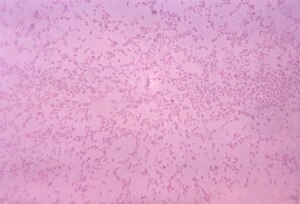Pasteurella
Pasteurella[edit]

Pasteurella is a genus of Gram-negative bacteria that are nonmotile, facultatively anaerobic, and coccobacilli. These bacteria are known to be pathogenic in animals and humans, causing a variety of diseases. The genus is named after the renowned French scientist Louis Pasteur.
Characteristics[edit]
Pasteurella species are small, nonmotile, and pleomorphic. They are typically coccobacilli, which means they are shaped like short rods or elongated cocci. These bacteria are facultative anaerobes, meaning they can grow in both the presence and absence of oxygen. They are oxidase-positive and catalase-positive, which are important characteristics used in their identification.
Pathogenicity[edit]
Pasteurella species are known to cause infections in both animals and humans. In animals, they are often associated with respiratory infections, such as pneumonia, and can also cause septicemia. In humans, Pasteurella multocida is the most common species associated with infections, typically following animal bites or scratches, particularly from cats and dogs. These infections can lead to cellulitis, abscesses, and in severe cases, systemic infections.
Transmission[edit]
The primary mode of transmission of Pasteurella to humans is through animal bites or scratches. The bacteria are part of the normal flora of the upper respiratory tract of many animals, including cats, dogs, and rabbits. When these animals bite or scratch humans, the bacteria can be introduced into the wound, leading to infection.
Diagnosis[edit]
Diagnosis of Pasteurella infections is typically made through culture and identification of the bacteria from clinical specimens. The bacteria can be isolated from wound swabs, blood, or other body fluids. Laboratory identification involves biochemical tests that demonstrate the characteristic features of Pasteurella, such as oxidase and catalase positivity.
Treatment[edit]
Infections caused by Pasteurella species are usually treated with antibiotics. Pasteurella multocida is generally susceptible to penicillin, which is often the antibiotic of choice. However, in cases of penicillin allergy, other antibiotics such as doxycycline or ciprofloxacin may be used. It is important to clean and disinfect animal bites and scratches promptly to prevent infection.
Prevention[edit]
Preventive measures include avoiding bites and scratches from animals, particularly those known to carry Pasteurella. Pet owners should ensure their animals are healthy and vaccinated. In the event of a bite or scratch, immediate cleaning and disinfection of the wound can help reduce the risk of infection.
Related pages[edit]
Ad. Transform your life with W8MD's Budget GLP-1 injections from $75


W8MD offers a medical weight loss program to lose weight in Philadelphia. Our physician-supervised medical weight loss provides:
- Weight loss injections in NYC (generic and brand names):
- Zepbound / Mounjaro, Wegovy / Ozempic, Saxenda
- Most insurances accepted or discounted self-pay rates. We will obtain insurance prior authorizations if needed.
- Generic GLP1 weight loss injections from $75 for the starting dose.
- Also offer prescription weight loss medications including Phentermine, Qsymia, Diethylpropion, Contrave etc.
NYC weight loss doctor appointmentsNYC weight loss doctor appointments
Start your NYC weight loss journey today at our NYC medical weight loss and Philadelphia medical weight loss clinics.
- Call 718-946-5500 to lose weight in NYC or for medical weight loss in Philadelphia 215-676-2334.
- Tags:NYC medical weight loss, Philadelphia lose weight Zepbound NYC, Budget GLP1 weight loss injections, Wegovy Philadelphia, Wegovy NYC, Philadelphia medical weight loss, Brookly weight loss and Wegovy NYC
|
WikiMD's Wellness Encyclopedia |
| Let Food Be Thy Medicine Medicine Thy Food - Hippocrates |
Medical Disclaimer: WikiMD is not a substitute for professional medical advice. The information on WikiMD is provided as an information resource only, may be incorrect, outdated or misleading, and is not to be used or relied on for any diagnostic or treatment purposes. Please consult your health care provider before making any healthcare decisions or for guidance about a specific medical condition. WikiMD expressly disclaims responsibility, and shall have no liability, for any damages, loss, injury, or liability whatsoever suffered as a result of your reliance on the information contained in this site. By visiting this site you agree to the foregoing terms and conditions, which may from time to time be changed or supplemented by WikiMD. If you do not agree to the foregoing terms and conditions, you should not enter or use this site. See full disclaimer.
Credits:Most images are courtesy of Wikimedia commons, and templates, categories Wikipedia, licensed under CC BY SA or similar.
Translate this page: - East Asian
中文,
日本,
한국어,
South Asian
हिन्दी,
தமிழ்,
తెలుగు,
Urdu,
ಕನ್ನಡ,
Southeast Asian
Indonesian,
Vietnamese,
Thai,
မြန်မာဘာသာ,
বাংলা
European
español,
Deutsch,
français,
Greek,
português do Brasil,
polski,
română,
русский,
Nederlands,
norsk,
svenska,
suomi,
Italian
Middle Eastern & African
عربى,
Turkish,
Persian,
Hebrew,
Afrikaans,
isiZulu,
Kiswahili,
Other
Bulgarian,
Hungarian,
Czech,
Swedish,
മലയാളം,
मराठी,
ਪੰਜਾਬੀ,
ગુજરાતી,
Portuguese,
Ukrainian